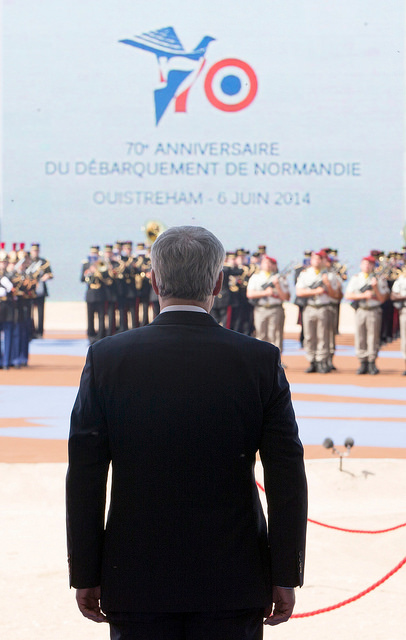Please help rabble.ca stop Harper’s election fraud plan. Become a monthly supporter.
The leaders who gathered in Normandy a week ago for D-Day’s 70th anniversary missed the point. They hailed the bravery of those who landed there and the causes they fought for. President Barack Obama called it “democracy’s beachhead” in the “struggle for freedom.” Stephen Harper said it was “the triumph of the values for which Canada stands. Freedom. Democracy. Justice.” He added a “curse” on anyone who “denies the very existence of evil,” as if he knows such people.
But the leaders at the time had another — more personal — perspective. I’m surmising this from their words in the 1945 preamble to the United Nations charter. (United Nations was what countries allied against Hitler et al. called themselves; it became the global organization.) It begins: “We the peoples of the United Nations determined to save succeeding generations from the scourge of war, which twice in our lifetime has brought untold sorrow to mankind …” This isn’t about one war for particular causes, even causes as large as freedom. It’s the coda to the experience of a generation. They signed it even before the first nuclear bombs were dropped on Japanese cities.
Their experience included the previously unthinkable carnage of “The Great War,” fought to “end all wars.” Followed just 20 years later — think how brief that is, except when you’re only 20 yourself — by another war, which was worse! With a global depression between. You’d have needed to be a dolt not to get the point. Even world leaders, always well insulated from truths obvious to normal people, got it: this must never happen again. They were shaken. You can hear it.
Among them was Lester Pearson, Canada’s ambassador to the U.S., who went on to be foreign minister, then prime minister. In 1956, when a crisis in the Mideast threatened to precipitate another one, he proposed a UN peacekeeping force, to which Canada contributed. That became our signature military orientation for 50 years — until Afghanistan. Then it changed, especially in the Harper years. We went back to fighting “real” wars, against “scumbags,” i.e. evil — as if there was something embarrassing about peacekeeping. Real armies fight real wars, like the guys who hit the beach in Normandy.
I was alerted to this by a teenager studying Canadian history, who chanced on the name Jacques Dextraze. He started as a private in the Second World War and became head of all Canada’s forces. But his glory days were as a peacekeeper in Congo where he held off troops himself, while evacuating missionaries by helicopter. It read, to the teen, as James Bondish. Nothing wussy there. There’s also Romeo Dallaire, who recently quit the unmilitary confines of the Senate. His tale as a peacekeeping general isn’t triumphal; it’s tragic and, in his own terms, failed. But it’s also heroic — there are more tragic heroes than the other kind.
The name that touches me most is Maj. Paeta Hess-von Kruedener. He was born Peter Hess in London, Ont., but changed it to honour his grandmother. He was a career soldier and paratrooper who died, at 44, manning an unarmed UN truce observation post in Lebanon during Israel’s 2006 invasion there. With him were three comrades: Finnish, Austrian and Chinese. Get the picture? They came under Israeli fire for hours. Repeated UN requests to stop firing were ignored, then they took a direct hit from a jet. The other governments all protested. Canada didn’t. It sounds like his tale has been largely covered up, for political reasons. I’d put it out there as exemplary and I bet it would inspire kids in a military direction.
And what of traditional soldiers like those feted last week? Military heroism is rarely as straightforward as on D-Day. Think of American Bowe Bergdahl, who came home last week from Afghanistan to confusing charges of treason. His mates say he could be both enthusiastic and detached from actual fighting and sometimes yearned for peaceable activities with villagers. It all rings plausibly, in the hectic jumble of war. We had somehow created a unique Canadian military tradition that was heroic and largely — though not always, if you think of Somalia or Haiti — noble. But we’ve traded it in for a mess of old-style military pottage.
This column was first published in the Toronto Star.
Photo: pmwebphotos/flickr



